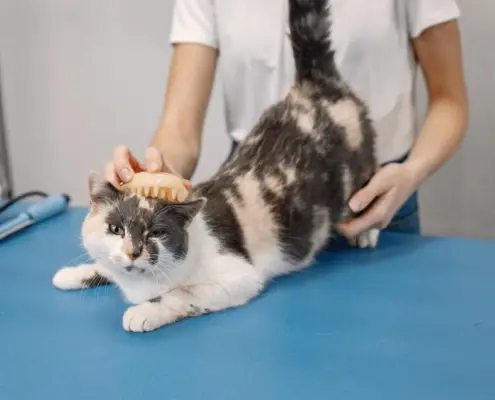
Cats are beloved companions, bringing joy and comfort to our lives. However, they are not immune to the dangers of external parasites. These tiny creatures can cause immense discomfort and even pose serious health risks to our feline friends. In this article, we will delve into the world of external parasites in cats, exploring the common types, signs and symptoms of infestation, health risks associated with them, prevention and control measures, as well as treatment options. By understanding these hidden dangers, we can better protect our furry companions and keep them parasite-free.
Common Types of External Parasites in Cats
External parasites come in various forms, each with its own distinct characteristics and effects on cats. The most common types include fleas, ticks, mites, and lice. Fleas are small, blood-sucking insects that can infest cats and cause severe itching, hair loss, and even anemia in severe cases. Ticks are arachnids that attach themselves to the skin of cats, feeding on their blood and potentially transmitting diseases. Mites are microscopic parasites that can cause skin infections and ear problems in cats. Lice are wingless insects that infest the fur and feathers of animals, leading to itching and discomfort. It is crucial to be aware of these parasites to prevent infestations and protect our cats from their harmful effects.
Signs and Symptoms of External Parasite Infestation
Detecting external parasite infestations in cats can be challenging, as some parasites are tiny and difficult to spot. However, there are certain signs and symptoms that can indicate their presence. Common signs include excessive scratching, biting, or licking of the fur, hair loss, skin irritations, redness, inflammation, and the presence of small black or brown specks (flea dirt) on the fur. Cats may also display behavioral changes, such as restlessness, irritability, and decreased appetite. It is important to pay close attention to these signs and seek veterinary care if infestation is suspected, as prompt treatment is crucial to prevent further complications.
Health Risks Associated with External Parasites in Cats
External parasites not only cause discomfort to cats but also pose significant health risks. Fleas, for instance, can lead to flea allergy dermatitis, a common skin condition characterized by severe itching and inflammation. Fleas can also transmit tapeworms, which can cause digestive issues in cats. Ticks, on the other hand, can transmit diseases such as Lyme disease and ehrlichiosis, which can have serious consequences on a cat’s overall health. Mite infestations can cause mange, resulting in intense itching, hair loss, and skin infections. Lice infestations, although less common, can still cause significant discomfort and affect the well-being of cats. These health risks highlight the importance of proactive prevention and treatment methods.
Prevention and Control of External Parasites
Preventing external parasite infestations in cats is key to ensuring their well-being. Regular grooming, including brushing and inspecting the fur, can help detect early signs of infestation. Additionally, using preventive measures such as flea and tick control products recommended by veterinarians can significantly reduce the risk of infestation. These products come in various forms, including spot-on treatments, collars, and oral medications. It is important to follow the instructions provided by the manufacturer and consult with a veterinarian to determine the most suitable preventive measures for your cat. Maintaining a clean and hygienic living environment, including regular vacuuming of carpets and bedding, can also help prevent infestations.
Treating External Parasite Infestations in Cats
If your cat is already infested with external parasites, prompt treatment is necessary to alleviate their discomfort and prevent further complications. Veterinarians may prescribe specific medications, such as topical treatments, oral medications, or shampoos, depending on the type of parasite and the severity of infestation. It is important to administer the treatment as directed, ensuring the full course is completed to eliminate all parasites. Regular follow-up visits to the veterinarian are essential to monitor the effectiveness of the treatment and make any necessary adjustments. In severe cases, additional supportive care, such as medications for skin infections or anemia, may be required.
Natural Remedies for External Parasites in Cats
For those who prefer natural remedies, there are alternative options available for treating external parasites in cats. Essential oils, such as lavender or neem oil, have been found to have insect-repellent properties. However, it is important to use caution when using essential oils on cats, as their sensitive skin may react differently compared to other animals. Consultation with a veterinarian is recommended before using any natural remedy to ensure the safety and effectiveness for your cat. Additionally, maintaining a clean and hygienic living environment, regularly washing bedding, and vacuuming can help to control infestations naturally.
The Importance of Regular Vet Check-ups for Detecting External Parasites
Regular veterinary check-ups are essential for maintaining the overall health and well-being of cats, including the detection of external parasites. Veterinarians are trained to identify early signs of infestations and provide appropriate treatment. During check-ups, they will thoroughly examine the cat’s skin, fur, and ears for any signs of parasites or related issues. They may also recommend routine blood tests to check for any underlying health conditions or the presence of diseases transmitted by parasites. By scheduling regular check-ups, cat owners can ensure that their furry companions are protected against external parasites and receive timely treatment if needed.
How to Protect Your Home and Family from External Parasites
External parasites not only pose a risk to cats but can also affect the entire household. To protect your home and family, it is important to implement preventive measures. Regularly vacuuming carpets, upholstery, and bedding can help remove any potential eggs or larvae. Washing bedding and blankets in hot water can also help eliminate parasites. Additionally, keeping outdoor areas tidy, removing any debris or tall grass where pests may reside, can reduce the risk of infestation. It is also advisable to consult with a professional pest control service to assess and treat your home if infestations persist.
Keeping Your Cat Parasite-Free
External parasites can be a hidden danger to our beloved cats, causing discomfort and health risks. By understanding the common types of parasites, recognizing the signs of infestation, and implementing preventive measures, we can keep our feline friends safe and parasite-free. Regular veterinary check-ups and prompt treatment are crucial for maintaining their well-being. Remember to consult with a veterinarian before using any natural remedies and take proactive steps to protect your home and family from external parasites. With proper care and preventive measures, we can provide our cats with a healthy and parasite-free environment they deserve.
Schedule a veterinary check-up for your cat today to ensure their protection against external parasites and overall well-being. Your furry companion deserves the best care possible!
If you enjoyed my article, I would appreciate you sharing it with your network.

Sima Ndlebe
Sima writes for CatBuzz. He is interested in Cats, Health and Fitness, and Entrepreneurship.
Published: 15 November 2023
Related Articles
Disclaimer
The content found on CatBuzz.org is presented on an "as is" basis and is intended for general consumer information and education purposes only. Any utilization of this information is voluntary and solely at the user's own risk.
None of the articles or content should be regarded as, or used in place of, veterinary medical advice, diagnosis, or treatment. The information provided on the website is purely for educational and informational intentions and should not be considered a substitute for professional guidance from a veterinarian or other qualified expert. The articles are designed to inform consumers about veterinary healthcare and medical matters that may impact their cat's daily life. It should be noted that this website and its services do not constitute the practice of any form of veterinary medical advice, diagnosis, or treatment. CatBuzz.org explicitly disclaims any liability for any direct or indirect damages or losses that may arise from the use of or reliance on the information contained within the content.
Consumers must consult a veterinarian, veterinary specialist, or another qualified veterinary healthcare provider when seeking advice regarding their cat's health or medical conditions. It is important not to ignore, avoid, or postpone seeking medical advice from a veterinarian or other qualified veterinary healthcare provider solely based on information obtained from this website. If you believe that your cat may be experiencing a medical issue or condition, it is imperative to promptly contact a qualified veterinary healthcare professional.




